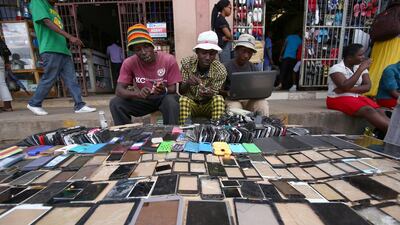Zimbabwe has more than its share of economic problems. The country does not have its own currency, the last one having fallen prey to hyperinflation; its transport system is so poor that it hinders trade; and the government has been posting budget deficits for several years now.
But companies from the UAE are playing an important role in preventing the country from sinking even deeper into its morass.
The UAE is one of Zimbabwe’s main trading partners. Companies from the UAE are dispersed throughout the Zimbabwean economy and Dubai is a favoured destination for Zimbabwean traders, tourists and medical patients.
Zimbabwe’s exports to the UAE are underpinned by the mineral resources – precious metals, including gold, and diamonds – that the African country holds in abundance. Zimbabwe has more than 13 million tonnes of gold reserves, the largest reserves of diamonds in the world and the world’s second-largest reserves of platinum, among other key mineral resources. Trade will continue to be anchored by the absolute advantages that Zimbabwe can offer.
Last year, Zimbabwe registered a trade surplus with the UAE. The southern African country’s exports to the UAE were US$116.6 million, while imports were $61.7m, representing a surplus of $54.9m in favour of Zimbabwe.
However, Zimbabwe posted a deficit of $2.38 billion in its trade with the rest of the world. Zimbabwe exported goods worth $2.83bn, with imports standing at $5.21bn.
The UAE was the third top export market for Zimbabwe last year, and a top 10 import source – major import products ranged from rice to industrial equipment.
There are a number of UAE companies in different sectors of the Zimbabwean economy. These include Mondore General Trading, owned by Tabarak Investment Bank, which is involved in agriculture and is looking at diversifying into mining and petroleum while also expanding its agricultural operations. Andre Homberg, Mondore’s executive director, told local media in 2014 that the “UAE relies on food imports and we are very concerned about food security, so we are very willing to invest heavily in Zimbabwe’s agriculture”.
Emirates is another UAE company that is prominent in Zimbabwe. In 2013, the airline introduced a 354-seat Boeing 777-300ER on its Dubai-Harare-Lusaka route, replacing the 237-seat Airbus A330-200. The 777 became the longest passenger aircraft ever to touch down at Harare International Airport and resulted in a capacity increase of more than 50 per cent. And a reduction in economy-class fares meant that more Zimbabweans could afford to travel to the UAE. Last year, Emirates increased its free baggage allowance for customers, which further encouraged travel.
Small Zimbabwean traders fly frequently to Dubai to buy merchandise such as clothes, mobile phones and electronic accessories. Some of this merchandise will later be sold in the streets of Harare, where the vendors earn their living.
Dubai is also a holiday destination for many Zimbabweans and, most importantly, provides employment to many Zimbabweans, especially in its hospitality sector.
Investment into Zimbabwe is expected to be encouraged this year by the establishment of special economic zones offering incentives such as exemption from corporate tax for the first five years of operation and 15 per cent thereafter, and duty free importation of capital equipment.
At the same time, production of diamonds, which are Zimbabwe’s top export to the UAE, has been declining in the past few years owing to falling diamond prices on the international market and the reorganisation of the diamond sector in Zimbabwe, which stalled operations. Last year, the country’s diamond exports to the world totalled about $120m, compared to $466m in 2013 and $350m in 2014. The UAE’s diamond imports from Zimbabwe have been declining less steeply, by an average of 17 per cent a year between 2011 and 2015.
Clemence Machadu is an economics writer based in Harare
business@thenational.ae
Follow The National's Business section on Twitter

